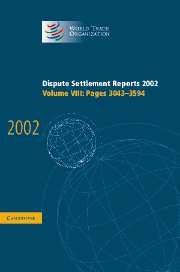Book contents
- Frontmatter
- Contents
- Chile – Price Band System and Safeguard Measures Relating to Certain Agricultural Products (WT/DS207/AB/R, WT/DS207/R): Report of the Appellate Body
- Chile – Price Band System and Safeguard Measures Relating to Certain Agricultural Products (WT/DS207/AB/R, WT/DS207/R): Report of the Panel
- European Communities – Trade Description of Sardines (WT/DS231/AB/R, WT/DS231/R): Report of the Appellate Body
- European Communities – Trade Description of Sardines (WT/DS231/AB/R, WT/DS231/R): Report of the Panel
- Cumulative Index of Published Disputes
European Communities – Trade Description of Sardines (WT/DS231/AB/R, WT/DS231/R): Report of the Panel
Published online by Cambridge University Press: 13 December 2017
- Frontmatter
- Contents
- Chile – Price Band System and Safeguard Measures Relating to Certain Agricultural Products (WT/DS207/AB/R, WT/DS207/R): Report of the Appellate Body
- Chile – Price Band System and Safeguard Measures Relating to Certain Agricultural Products (WT/DS207/AB/R, WT/DS207/R): Report of the Panel
- European Communities – Trade Description of Sardines (WT/DS231/AB/R, WT/DS231/R): Report of the Appellate Body
- European Communities – Trade Description of Sardines (WT/DS231/AB/R, WT/DS231/R): Report of the Panel
- Cumulative Index of Published Disputes
Summary
INTRODUCTION
In a communication dated 20 March 2001, Peru requested consultations with the European Communities pursuant to Article 4 of the Understanding on Rules and Procedures Governing the Settlement of Disputes (“DSU”), Article XXII of the General Agreement on Tariffs and Trade 1994 (the “GATT 1994”), and Article 14 of the Agreement on Technical Barriers to Trade (the “TBT Agreement”), with respect to Council Regulation (EEC) No. 2136/89 (the “EC Regulation” or “Regulation”) laying down common marketing standards for preserved sardines.
On 31 May 2001, Peru and the European Communities held the requested consultations but failed to reach a mutually satisfactory solution.
In a communication dated 7 June 2001, Peru requested the establishment of a panel to examine the EC Regulation, with the standard terms of reference set out in Article 7 of the DSU. Peru made its request in accordance with Article XXIII of the GATT 1994, Articles 4 and 6 of the DSU and Article 14 of the TBT Agreement. In its communication, Peru stated that it considered the EC Regulation to constitute an unnecessary obstacle to international trade which is inconsistent with Articles 2 and 12 of the TBT Agreement, Article XI:1 of the GATT 1994 and the principle of non-discrimination under Articles I and III of the GATT 1994.
At its meeting on 24 July 2001, the Dispute Settlement Body (“DSB”) established a panel pursuant to Peru's request in accordance with Article 6 of the DSU. Canada, Chile, Colombia, Ecuador, the United States and Venezuela reserved their rights to participate in the Panel proceedings as third parties in accordance with Article 10 of the DSU.
At the meeting of the DSB on 24 July 2001, the parties to the dispute agreed that the Panel should have standard terms of reference provided in Article 2.1 of the DSU. The terms of reference of the Panel are as follows:
To examine, in the light of the relevant provisions of the covered agreements cited by Peru in document WT/DS231/6, the matter referred to the DSB by Peru in that document, and to make such findings as will assist the DSB in making the recommendations or in giving the rulings provided for in those agreements.
- Type
- Chapter
- Information
- Dispute Settlement Reports 2002 , pp. 3451 - 3586Publisher: Cambridge University PressPrint publication year: 2005
- 3
- Cited by



